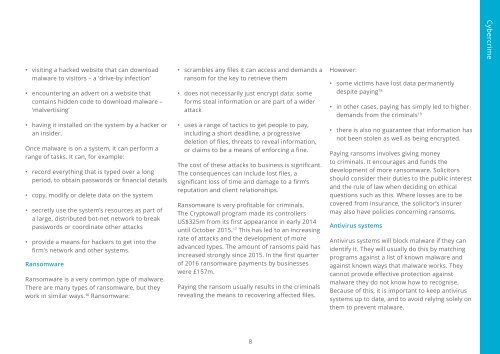IT security
it-security
it-security
Create successful ePaper yourself
Turn your PDF publications into a flip-book with our unique Google optimized e-Paper software.
Cybercrime<br />
• visiting a hacked website that can download<br />
malware to visitors – a ‘drive-by infection’<br />
• encountering an advert on a website that<br />
contains hidden code to download malware –<br />
‘malvertising’<br />
• having it installed on the system by a hacker or<br />
an insider.<br />
Once malware is on a system, it can perform a<br />
range of tasks. It can, for example:<br />
• record everything that is typed over a long<br />
period, to obtain passwords or financial details<br />
• copy, modify or delete data on the system<br />
• secretly use the system’s resources as part of<br />
a large, distributed bot-net network to break<br />
passwords or coordinate other attacks<br />
• provide a means for hackers to get into the<br />
firm’s network and other systems.<br />
Ransomware<br />
Ransomware is a very common type of malware.<br />
There are many types of ransomware, but they<br />
work in similar ways. 16 Ransomware:<br />
• scrambles any files it can access and demands a<br />
ransom for the key to retrieve them<br />
• does not necessarily just encrypt data: some<br />
forms steal information or are part of a wider<br />
attack<br />
• uses a range of tactics to get people to pay,<br />
including a short deadline, a progressive<br />
deletion of files, threats to reveal information,<br />
or claims to be a means of enforcing a fine.<br />
The cost of these attacks to business is significant.<br />
The consequences can include lost files, a<br />
significant loss of time and damage to a firm’s<br />
reputation and client relationships.<br />
Ransomware is very profitable for criminals.<br />
The Cryptowall program made its controllers<br />
US$325m from its first appearance in early 2014<br />
until October 2015. 17 This has led to an increasing<br />
rate of attacks and the development of more<br />
advanced types. The amount of ransoms paid has<br />
increased strongly since 2015. In the first quarter<br />
of 2016 ransomware payments by businesses<br />
were £157m.<br />
Paying the ransom usually results in the criminals<br />
revealing the means to recovering affected files.<br />
However:<br />
• some victims have lost data permanently<br />
despite paying 18<br />
• in other cases, paying has simply led to higher<br />
demands from the criminals 19<br />
• there is also no guarantee that information has<br />
not been stolen as well as being encrypted.<br />
Paying ransoms involves giving money<br />
to criminals. It encourages and funds the<br />
development of more ransomware. Solicitors<br />
should consider their duties to the public interest<br />
and the rule of law when deciding on ethical<br />
questions such as this. Where losses are to be<br />
covered from insurance, the solicitor’s insurer<br />
may also have policies concerning ransoms.<br />
Antivirus systems<br />
Antivirus systems will block malware if they can<br />
identify it. They will usually do this by matching<br />
programs against a list of known malware and<br />
against known ways that malware works. They<br />
cannot provide effective protection against<br />
malware they do not know how to recognise.<br />
Because of this, it is important to keep antivirus<br />
systems up to date, and to avoid relying solely on<br />
them to prevent malware.<br />
8


